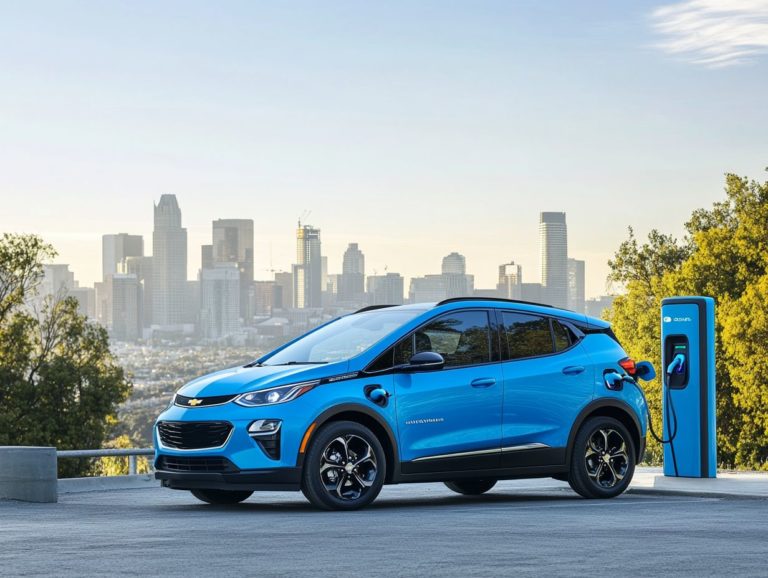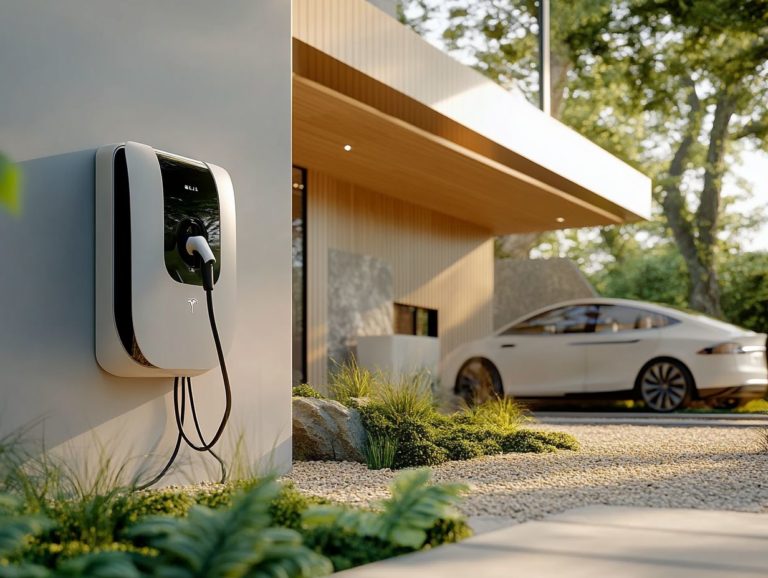Comparing EV Charging Costs: What to Expect
As electric vehicles (EVs) gain traction in today’s market, understanding the costs tied to charging them is crucial for both current and future owners.
This article provides a comprehensive overview of EV charging expenses, exploring the many factors that shape these costs.
You ll discover the various types of charging stations Level 1, Level 2, and DC Fast Charging and learn how to calculate your charging expenses.
We’ll explore regional variations, offer strategies to cut costs, and discuss emerging trends in the EV charging landscape.
Get ready to master EV charging and save money!
Contents
- Key Takeaways:
- Overview of EV Charging Costs
- Types of EV Charging
- Charging Methods
- Calculating Charging Costs
- Comparing Charging Costs Across Regions
- Tips for Reducing EV Charging Costs
- Future Trends in EV Charging Costs
- Frequently Asked Questions
- What is the average cost of charging an electric vehicle?
- What is the difference between home and public charging costs?
- Are there any hidden costs when charging an EV?
- What should I expect in terms of charging time and cost for a long-distance trip?
- How can I save money on EV charging costs?
- Are there any government incentives or programs available to help with EV charging costs?
Key Takeaways:
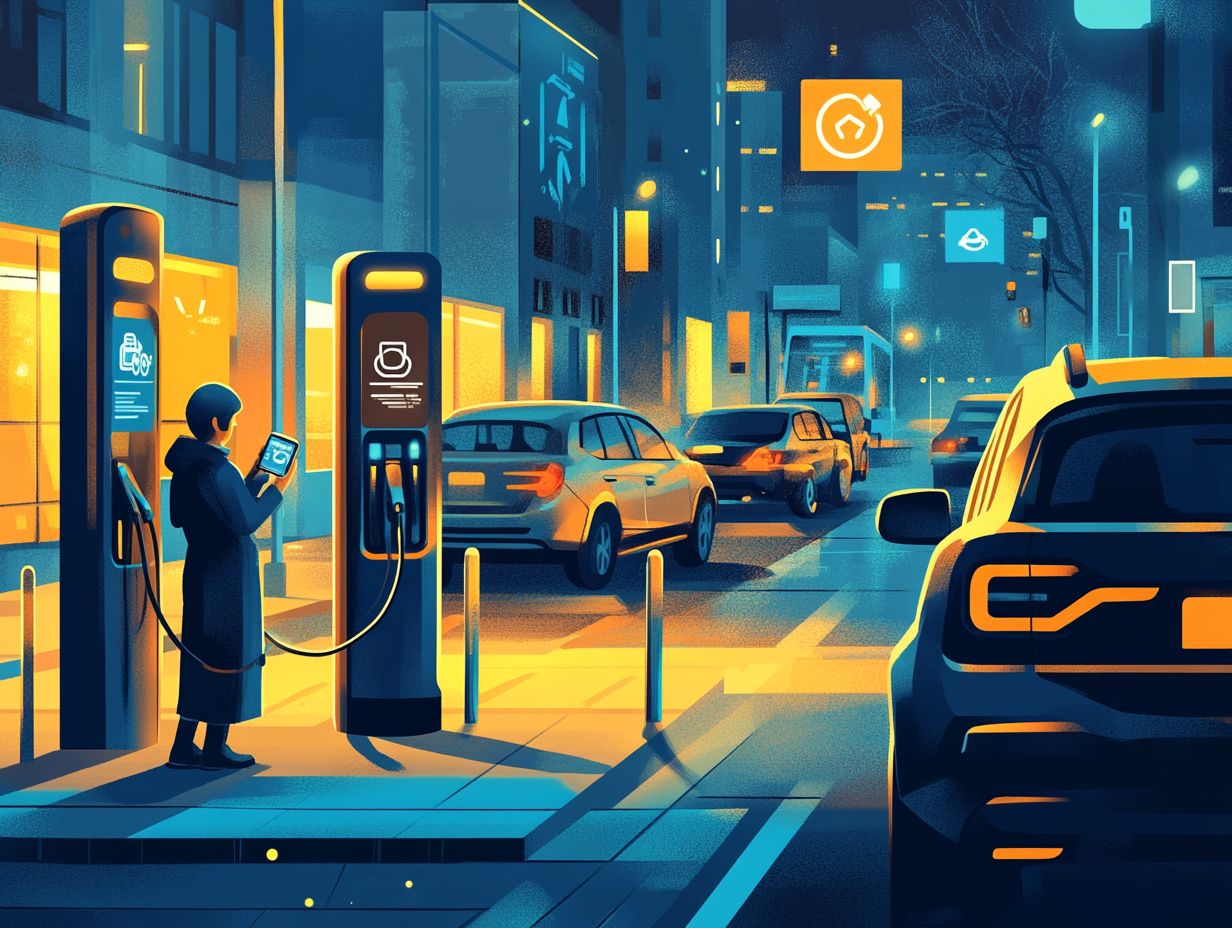
- EV charging costs are influenced by factors such as electricity rates, charging speed, and location.
- Comparing the costs of different types of EV charging can help you find the most cost-effective option for your needs.
- Adopting efficient charging strategies and staying informed about regional differences can help lower EV charging costs.
Overview of EV Charging Costs
Understanding EV charging costs is essential for both current and prospective electric vehicle (EV) owners. This knowledge includes various factors that impact the total expenses associated with charging your vehicle.
In today’s rapidly changing automotive landscape, awareness of the cost implications of both home and public charging is critical for effective travel planning.
Insights into energy consumption, pricing strategies, and diverse charging options can significantly affect your financial picture and driving habits.
Factors that Affect Charging Costs
Several factors influence the costs associated with charging electric vehicles, including energy prices and your specific charging habits. The cost per kWh often fluctuates based on regional energy prices, which can vary by state. It s essential to explore charging options and strategies that align with your driving patterns.
For example, if you re driving in California, you might face higher rates than someone in Texas, where energy prices are generally more favorable. The size of your vehicle’s battery also plays a crucial role; larger batteries take longer to charge, leading to increased costs, especially during peak hours when electricity prices are highest.
Understanding your personal driving habits is equally important. If you primarily charge at home during off-peak times, you can significantly reduce your overall costs. Different charging options like home chargers, public stations, and fast chargers have varying pricing structures, making it vital to stay informed.
Types of EV Charging
Knowing the different types of EV charging options is vital for electric vehicle owners, as they impact charging speed, costs, and overall convenience. The available charging options span several categories.
- Level 1 chargers are commonly used at home, offering a basic yet accessible solution.
- In contrast, Level 2 chargers excel in public charging stations, providing efficiency where it matters most.
- For long-distance travel, DC Fast Charging options, like Tesla Superchargers, are essential, ensuring your road trips are smooth with minimal downtime.
Charging Methods
Level 1, Level 2, and DC Fast Charging
Level 1, Level 2, and DC Fast Charging are the three primary charging methods available to you as an electric vehicle owner. Each method offers distinct benefits and charging speeds. Level 1 chargers, often found in residential areas, are the slowest option. They are best suited for overnight home charging.
In contrast, Level 2 chargers provide a faster charging experience, making them a popular choice at public charging stations. If you rely on DC Fast Charging especially through networks like Tesla Superchargers you’ll experience rapid replenishment, delivering substantial power in a remarkably short time.
Understanding these options is essential for managing your charging costs and times effectively. Different EV models have varying capacities to utilize each method. For example, while a Level 1 charger might take eight to twelve hours to fully charge a standard electric sedan, a Level 2 charger can reduce that time to about four to six hours, making it perfect for your daily commute.
Conversely, if you rely on DC Fast Charging, you’ll find it optimal for quick stops during longer journeys. A mere 30-minute charge can provide enough range to keep you on the move. Your individual driving habits significantly influence your choice of charging method.
Calculating Charging Costs

Calculating charging costs for electric vehicles is an essential skill that gives you the power to manage your expenses effectively and optimize your energy consumption, whether at home or at public charging stations.
Check your electricity rates to discover amazing savings! By analyzing the cost per kilowatt-hour (kWh), you can make informed choices about your charging habits. This approach not only helps you maximize the benefits of available federal tax credits but also minimizes your overall charging expenditures, allowing you to drive with both efficiency and confidence.
Methods for Estimating Costs
Estimating the costs associated with electric vehicle charging can be achieved through various methods, providing you with the tools to make informed financial decisions about your charging habits. By utilizing price comparison tools and charging apps, you gain insight into how electricity prices change, enabling you to identify the most cost-effective charging solutions based on current energy prices.
Evaluating factors such as time of use can significantly impact your overall charging expenses. Many utilities offer lower rates during off-peak hours, so don t miss out on saving money by charging during these times! By analyzing your personal charging patterns, you can manage your charging schedules more effectively.
Integrating charging apps that provide real-time updates can enhance your travel planning, allowing you to locate cost-efficient charging stations along your routes. This strategic approach not only helps with budgeting but also elevates the overall electric vehicle ownership experience.
Comparing Charging Costs Across Regions
For electric vehicle owners, comparing charging costs across various regions is essential. Prices can fluctuate considerably due to local energy policies, infrastructure, and the options available. To help with this, check out electric car costs: a price comparison guide.
Your state of residence whether it s California, Hawaii, or Nevada plays a pivotal role in shaping the affordability and accessibility of both public and home charging options. This directly influences the overall cost of owning an EV.
Regional Differences and Factors to Consider
Regional differences in charging costs can significantly impact you, an electric vehicle owner. Variations in energy prices and public charging infrastructure ultimately dictate the overall affordability of owning an EV. Understanding these differences especially in states like California and Washington is essential for effective travel planning and budgeting for your EV charging needs.
Key factors influence these regional differences. Local energy policies can either encourage or hinder renewable energy adoption, which directly affects your charging costs. The availability of charging stations also plays a crucial role. Areas with greater access typically offer more competitive rates, while others may subject you to higher expenses due to scarcity.
Infrastructure development, including the optimization of electric grids and the integration of smart technology, affects both the efficiency and price of public and home charging. By considering these elements, you can navigate your costs and energy use more effectively across different states.
Tips for Reducing EV Charging Costs
Reducing EV charging costs is a priority for many electric vehicle owners like yourself. Embracing efficient charging strategies can markedly decrease your expenses while elevating your overall EV ownership experience.
By fine-tuning your charging habits, opting for home charging during off-peak hours, and utilizing charging apps, you can deftly maneuver through fluctuating energy prices to uncover the most cost-effective solutions.
Efficient Charging Strategies
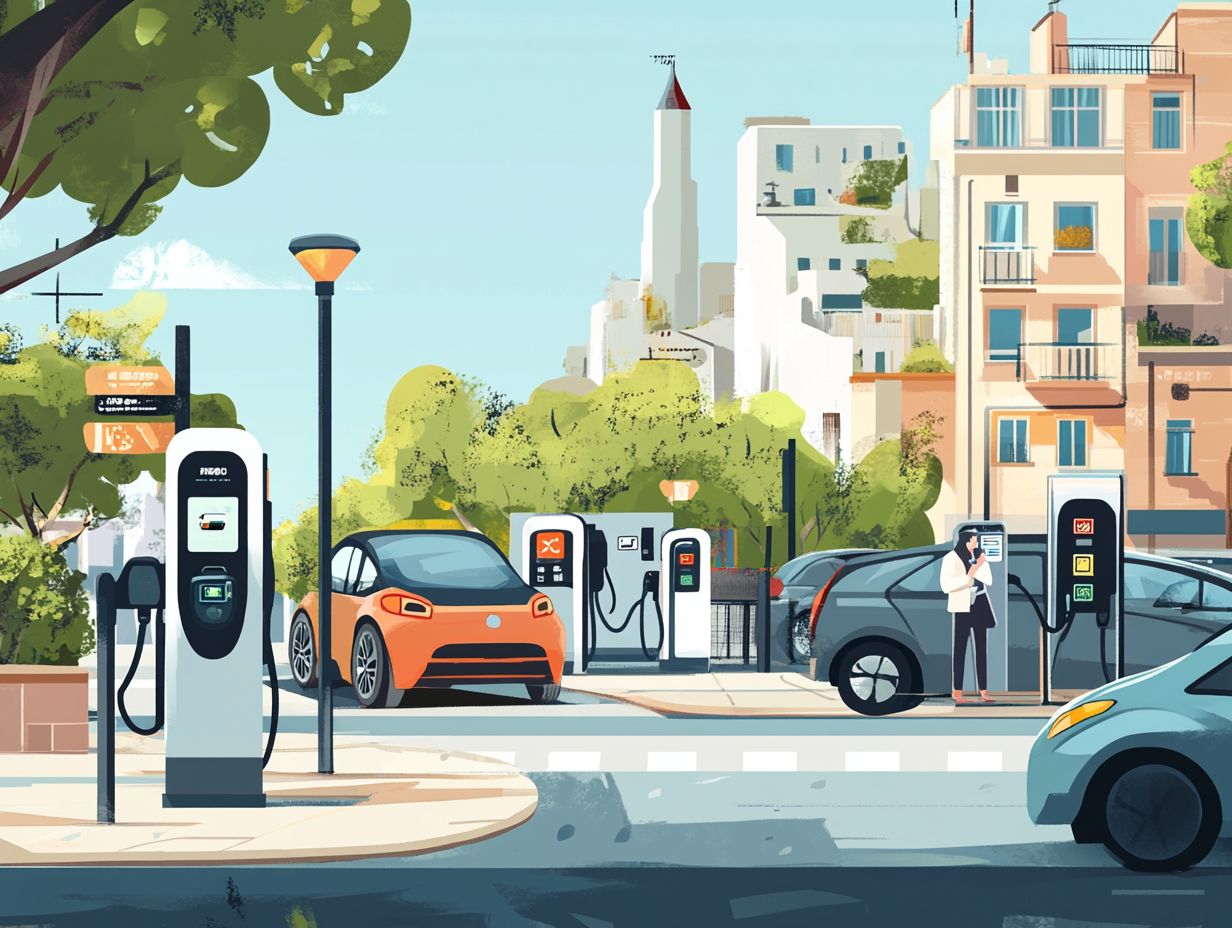
Implementing efficient charging strategies is essential for you as an electric vehicle owner, especially if you want to optimize your charging costs and overall energy consumption. By understanding your charging patterns and strategically choosing when and where to charge whether at home or at public charging stations you can significantly reduce your charging expenses.
This means being aware of peak and off-peak hours, particularly when using Level 2 chargers, a type of charger that works faster than standard chargers. For example, charging during off-peak periods often leads to reduced electricity rates, resulting in cost savings that can accumulate over time.
Don t overlook the benefits of federal tax credits either; these can further enhance your savings as an electric vehicle owner.
By leveraging these insights and adopting a calculated approach to charging, you can maximize the financial advantages of your electric vehicle while also playing your part in creating a greener environment.
Future Trends in EV Charging Costs
Get ready for exciting changes in EV charging costs! With the growing adoption of electric vehicles, you can anticipate that future trends in EV charging costs will evolve significantly. This evolution will be propelled by technological advancements and a strong shift toward renewable energy solutions.
Changing pricing strategies for charging, enhanced charging options, and greater investment in charging infrastructure will be key factors in shaping the landscape of charging costs for you as an EV owner.
Predictions and Potential Changes
Predictions about EV charging costs indicate that as renewable energy sources gain traction, you may see the costs associated with charging electric vehicles stabilizing or even decreasing over time. This transition could pave the way for innovative charging solutions that enhance both convenience and affordability for you as an EV owner.
As the infrastructure supporting electric vehicles expands, advancements in battery technology and charging efficiency will significantly influence these costs. The rise of ultra-fast charging stations can dramatically reduce charging times, altering how you approach your charging habits.
Favorable government policies can further promote widespread adoption among consumers like yourself. Increased incentives for renewable energy integration and subsidies for EV users can stimulate growth. Market dynamics think competition among service providers and a movement toward residential and workplace charging solutions are likely to diversify your charging options, ultimately benefiting you in the long run.
Frequently Asked Questions
What is the average cost of charging an electric vehicle?
The average cost of charging an electric vehicle varies. It depends on factors like the type of EV, the charging method, and local electricity rates.
A full charge typically costs between $0.10 and $0.25 per kWh.
What is the difference between home and public charging costs?
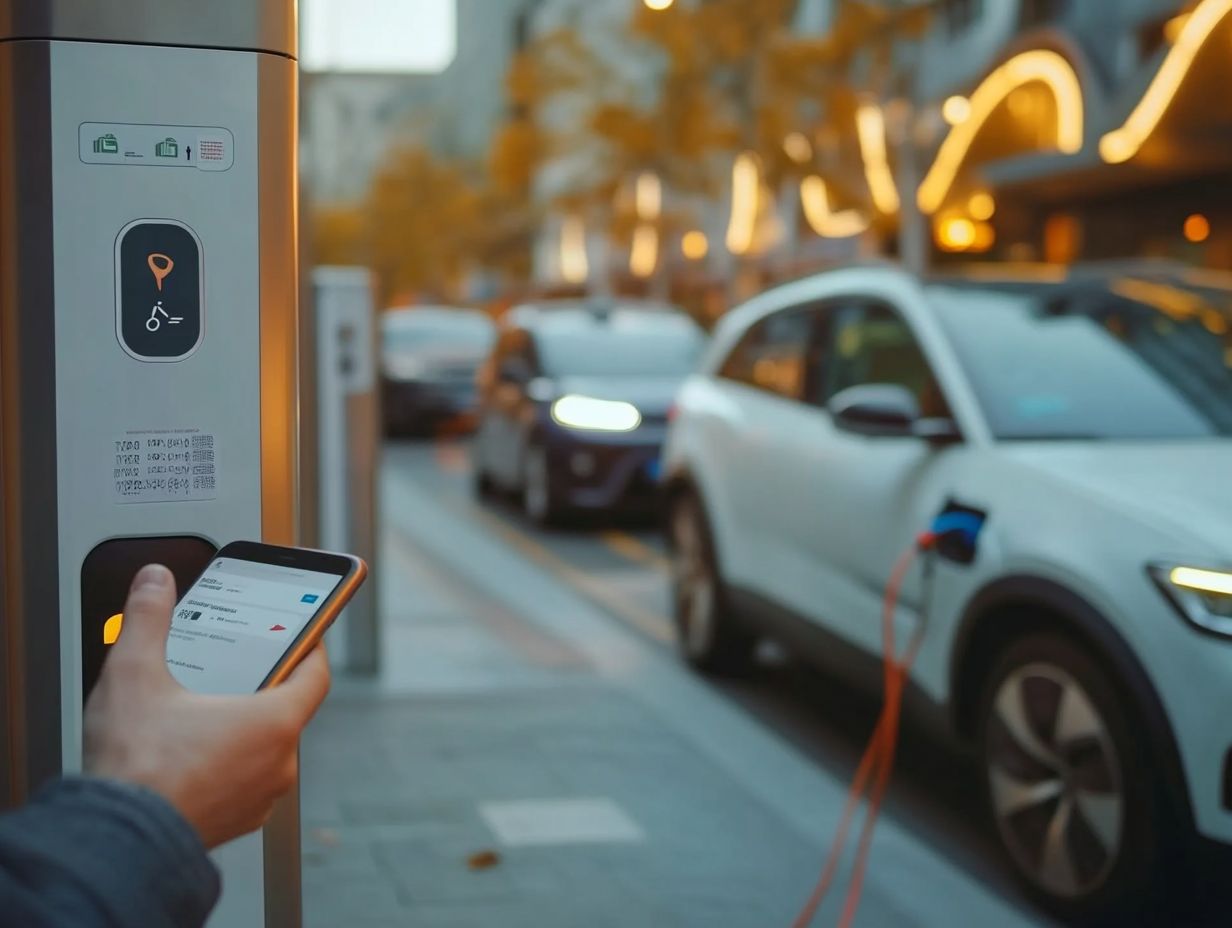
Charging at home is usually cheaper than at public stations. Home rates match your residential electricity, while public stations may add extra fees.
Hidden costs can come into play. These include installation fees for home chargers, membership fees for public networks, and parking fees at charging stations.
What should I expect in terms of charging time and cost for a long-distance trip?
Charging time and costs depend on your travel distance and the charging speed of your EV. Plan your trip carefully to account for charging time and costs to avoid delays.
How can I save money on EV charging costs?
To save money, charge your EV during lower electricity rate times, typically at night. Installing a home charger and using free public stations can also help cut costs.
Are there any government incentives or programs available to help with EV charging costs?
Yes! Various government incentives can help lower your EV charging costs. Discover the exciting incentives available to help you save on EV charging costs! Act now to take advantage of tax credits, rebates for EV purchases, and grants for public chargers in your area!

